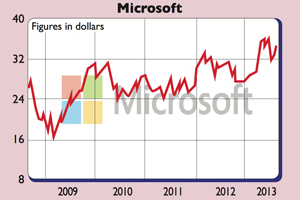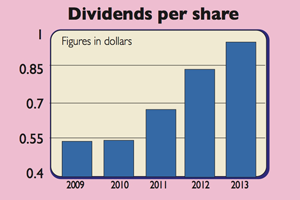Shares in focus: Is Microsoft safe behind its moat?
Microsoft's glory days may be behind it, but the software company still makes solid profits. Should investors buy in? Phil Oakley investigates.
Get the latest financial news, insights and expert analysis from our award-winning MoneyWeek team, to help you understand what really matters when it comes to your finances.
You are now subscribed
Your newsletter sign-up was successful
Want to add more newsletters?

Twice daily
MoneyWeek
Get the latest financial news, insights and expert analysis from our award-winning MoneyWeek team, to help you understand what really matters when it comes to your finances.

Four times a week
Look After My Bills
Sign up to our free money-saving newsletter, filled with the latest news and expert advice to help you find the best tips and deals for managing your bills. Start saving today!
Its glory days may be behind it, but Microsoft still makes solid profits, says Phil Oakley.
Microsoft is one of the greatest corporate success stories of all time. Having begun life in 1975, its Windows operating system revolutionised the personal computer (PC) market in the 1980s and established itself in millions of households across the world. Meanwhile, products such as Microsoft Office made workers far more productive. By the end of the 1990s technology boom, Microsoft had become the world's most valuable company, and in the early 2000s, it even came under attack for being too dominant.
But in recent years, the company has been shrouded in doom and gloom. It has been eclipsed by the likes of Apple and Google, which have become the kings of the internet, smartphones and tablet computers. Microsoft has made little progress in these areas and seems to have lost its way. It has been lumped together with former champions such as Intel and Yahoo, which are struggling to cope with the shift from the PC and the growing trend of internet usage for everyday tasks.
MoneyWeek
Subscribe to MoneyWeek today and get your first six magazine issues absolutely FREE

Sign up to Money Morning
Don't miss the latest investment and personal finances news, market analysis, plus money-saving tips with our free twice-daily newsletter
Don't miss the latest investment and personal finances news, market analysis, plus money-saving tips with our free twice-daily newsletter
Last week, Steve Ballmer, Microsoft's chief executive for the last 13 years, announced he was retiring. In some ways, Ballmer has been unlucky. He took over from Bill Gates when Microsoft was at its peak and the shares of technology companies were grossly overvalued. It's difficult to see how anyone could have made the company more valuable.
But in other ways Ballmer has to take the blame for Microsoft's stagnation. He greatly underestimated the threats posed by Apple and Google and confused investors by trying to buy Yahoo, for example, and spending lots of money buying internet telecoms company Skype.
The shares leapt 9% on the news of his resignation. But is turning Microsoft around just a simple matter of changing the man at the top? Or is it destined for years of decline?
What lies ahead
But I can't help thinking that the media and the investment world are too obsessed with these weaknesses. Despite the seemingly constant debate over its future, owning Microsoft hasn't been too disastrous over the last year. The shares are up by nearly 12%. That's lower than the 17% gain of the S&P 500, but it compares favourably with Apple, whose shares have lost around 25%.
And while Microsoft's profits have been flat over the same period, its business is nowhere near imploding. Windows aside, Microsoft actually makes most of its money from selling stuff to companies rather than retail customers. Here, the business is actually doing quite well.
Microsoft's servers business systems that help computer networks work is doing well and profits are growing. The business division, meanwhile, which includes products such as Microsoft Office, is more than holding its own and could hold the key to any Microsoft revival.
The company has invested heavily in cloud computing with its Windows Azure and Office 365 products, and this could pay off. Cloud computing is growing in importance to businesses as it allows employees to access their work wherever they have an internet connection. Despite attempts by Google to gain a foothold in the office software market, MS Word, Excel and Powerpoint are deeply entrenched within most big companies. Employees know how to use them, which makes companies unlikely to ditch them for something else.
The combination of the cloud and Office means Microsoft may still have a formidable business with a big economic moat that rivals cannot breach. If demand for these services can keep growing, then there could be a decent investment case. And there's no denying the fact that its financial performance remains impressive.
Three numbers stand out: operating margins at 34.4% are not far off Apple's, even though Microsoft's profits may prove more resilient than those coming from the iPhone. Free cash flow of $24.6bn in the year to June 2013 was above its reported net profits not many companies can boast that. Finally, it has a net cash pile of $61.4bn, which means that Microsoft's return on the net money invested in its business is a staggering 86.3%.
Should you buy the shares?
Ballmer's replacement will have a tough job but will have some good businesses to work with too. We tipped the shares as a buy at $28 just over two years ago because we thought they were cheap. They are still cheap enough to buy now.
Verdict: buy


Directors' shareholdings
Stay up to date with MoneyWeek:Follow us onTwitter,FacebookandGoogle+
Get the latest financial news, insights and expert analysis from our award-winning MoneyWeek team, to help you understand what really matters when it comes to your finances.
Phil spent 13 years as an investment analyst for both stockbroking and fund management companies.
-
 Average UK house price reaches £300,000 for first time, Halifax says
Average UK house price reaches £300,000 for first time, Halifax saysWhile the average house price has topped £300k, regional disparities still remain, Halifax finds.
-
 Barings Emerging Europe trust bounces back from Russia woes
Barings Emerging Europe trust bounces back from Russia woesBarings Emerging Europe trust has added the Middle East and Africa to its mandate, delivering a strong recovery, says Max King